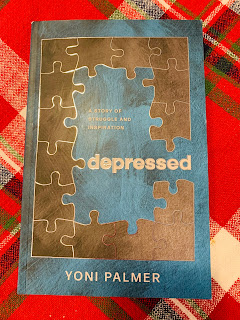 | |
| Depressed-by Yoni Palmer, Mosaic Press |
Depressed--a different take on depression, a Jewish point of view.
Well, it isn't so different, not if you are a Jewish, observant psychotherapist, but it is a lovely little book, even wonderful, emphasizing among other things the need (for some of us) to procreate and how devastating it can be when we fail.
If you're a little bit knowledgable of Tanach, those books that follow the Five Books of Moses, you will recognize some of Yoni Palmer's references, especially the story of King Saul in the Book of Samuel (Samuel I). You'll remember noticing, even in that very first reading years ago, that Israel's first king suffered an Axis I disorder--bad. Saul's courtiers did what they could to cheer him up, even brought in a local musician, David. Later the king would chase after David in a paranoid effort to kill him, ultimately killing himself. So out of sorts puts it mildly when we speak of King Shaul.
Anyway.
More of the back story than anyone needs to read. We went to Israel a few weeks ago, had tried to get in much earlier during the pandemic but the country shut its borders to us, fearing contagion would have none of our bringing the disease to Israel. But now that everyone in this tiny country has had covid or been exposed, and many are vaccinated times four, they opened up. And when they did I jumped on a direct flight, ticketed immediately. This before Omicron inserted its viral head into the Israeli calculus. Once the variant took hold the Ministry of Health made people wish they hadn't wanted to return to the homeland--so many hoops to jump through to fly. Then that return flight to the US and a stop in Newark to deplane, retrieve bags, go throught passport control and customs, recheck bags, security again. Why they had to cancel that direct flight no one knows. (Hey, a blog is for venting, am I right?)
It just so happened that our trip coincided with a dedication of stained glass windows in a synagogue. The windows, each depicting a female Jewish heroine, are dedicated to my dear sister-in-law, her memory should be a blessing. She passed away a year ago after a valiant struggle with 4 or 5 different types of cancers. Damn that disease. There, I said it.
At the dedication a favorite cousin of ours handed me a book. Depressed. That's the title. I automatically recoiled. I tend to read either fluffy, funny things, non-fiction (am deep into the Vietnam War right now), or well-written novels. (Sure, sure, I read about neopronouns, too). If a story is about a culture I'm not familiar with, like Native Americans, or people from Asia or Africa, I'll read it cover to cover. These are inevitably sad, but worth the trip.
So when Yoni Palmer hands me a very slim paperback about depression published by Mosaic Press, inside I groan. I feel bad for groaning and hope I am not showing the groan, but in my home there are two full shelves of books on depression, bipolar disorder, and suicide prevention. At least this treatment is light, only 95 pages and will fit right in.
I read Depressed in one sitting, most pleasantly surprised. It is raw, personal, and insightful. When I ask Yoni what he is doing these days he unapologetically tells me, 'I'm a writer.' How many of us have the guts to say that? I think he also has a day job.
What I like about his story is not so much his struggle with depression--I've heard twenty thousand of these first hand, I wish this were an exaggeration but people do seek help and they do get better, thank GD. It is Yoni's research into the Talmudic treatment of depression that keeps me in the game. He searches for the 'Jewish take' on the disorder and he finds it.
I'll sum up that Jewish take with two words: Depression is.
Rather than ignore it or consider depression a weakness or character failure, even some sign of lack of faith, Judaism accepts it--always has. Many say that when we accept what we're feeling, the weight, the burden lightens just a little bit, a sliver. But a sliver, perhaps a shot of serotonin, is good! If we don't accept something we are likely judging it negatively and judging one's self negatively hurts, and it takes a lot of psychic energy--way too much time and energy. This could be one of the reasons depression is so exhausting. Coping with how others judge us, too, takes valuable emotional resources, too much ram. Better to float, sleep, rest, not think. Medicate for awhile. Go to therapy.
You can find Yoni's book here.
Winter's almost over friends. Not that we're judging winter, we couldn't possibly diss all that white, black and gray that we see if we look out the window. No, we're good. Right?
P.S. My daughter just sent me this wonderful opinion piece in the Jerusalem Post by Harold Goldmeier, another take on not judging: Jews and suicide
therapydoc










